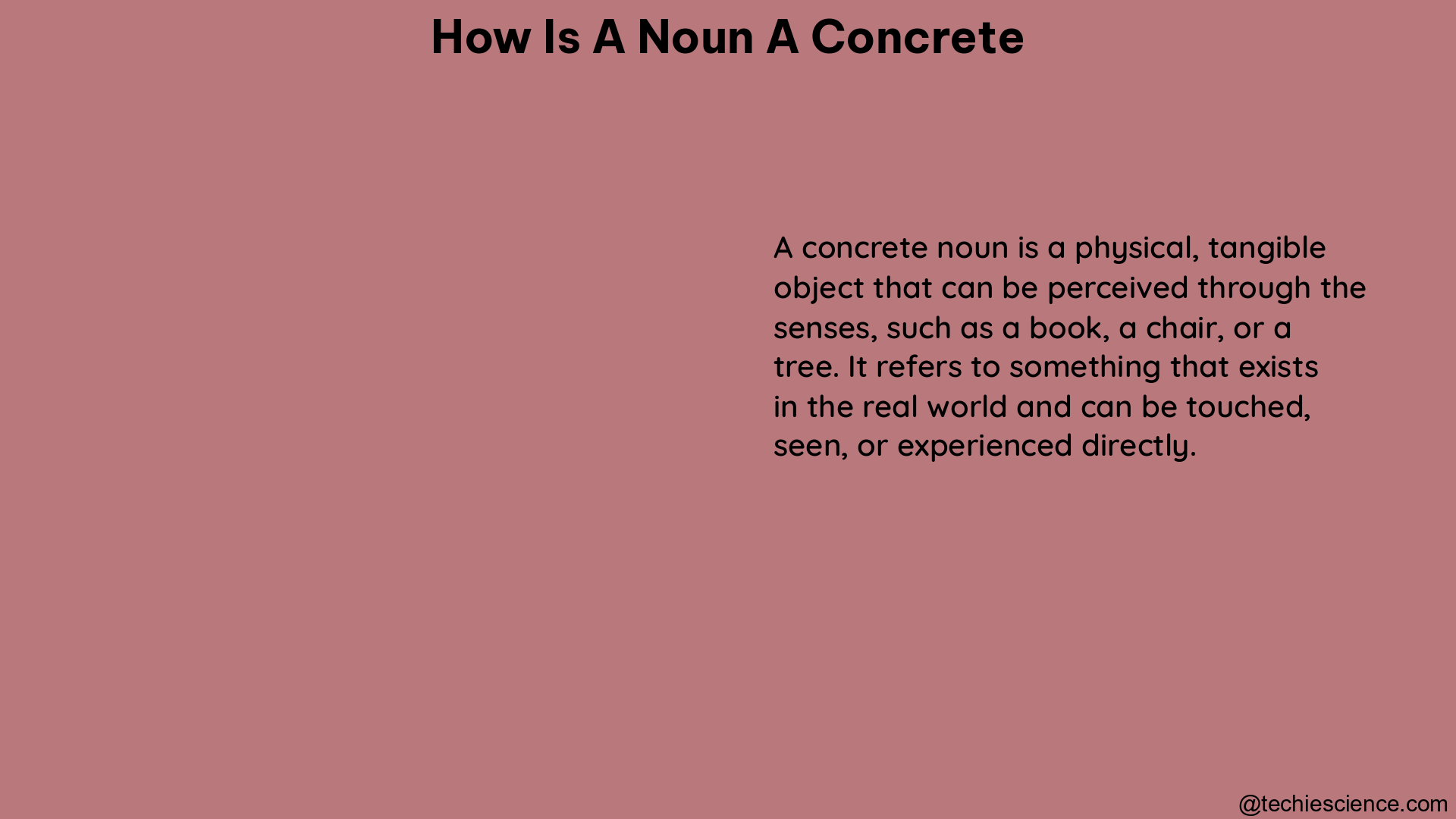A noun is considered concrete if it refers to a person, place, or thing that can be perceived through one or more of the five senses: sight, sound, smell, taste, or touch. These nouns are tangible and can be experienced physically. In this comprehensive guide, we will delve into the definition, examples, and advanced details of concrete nouns, providing a thorough understanding of this fundamental grammatical concept.
Definition and Examples of Concrete Nouns
Concrete Nouns are Physical
Concrete nouns are physical entities that can be seen, heard, smelled, tasted, or touched. They are tangible and can be experienced through the senses. Examples of concrete nouns include:
- Living things: dog, cat, person
- Inanimate objects: chair, book, car
- Places: park, city, house
- Food: apple, pizza, cake
- Natural phenomena: sun, rain, wind
Common and Proper Concrete Nouns
Both common nouns and proper nouns can be considered concrete. Common nouns are general terms, such as “dog,” while proper nouns are specific names, like “John” or “London.”
Singular and Plural Concrete Nouns
Concrete nouns can be singular (e.g., dog) or plural (e.g., dogs).
Countable and Uncountable Concrete Nouns
Concrete nouns can be countable (e.g., one dog, two dogs) or uncountable (e.g., water, air).
Distinguishing Concrete from Abstract Nouns

Abstract Nouns are Nonphysical
In contrast to concrete nouns, abstract nouns are nonphysical and cannot be perceived through the senses. Examples of abstract nouns include:
- Emotions: happiness, sadness, love
- Concepts: freedom, justice, hope
- Ideas: thought, imagination, creativity
Abstract Nouns are Intangible
Abstract nouns are intangible and cannot be seen, heard, smelled, tasted, or touched. Examples include:
- Feelings: joy, anger, fear
- Qualities: kindness, beauty, intelligence
- Events: birthday, wedding, graduation
Examples and Activities for Identifying Concrete Nouns
Identifying Concrete Nouns
To identify concrete nouns, look for nouns that can be experienced through the senses. For example, in the sentence “The sun was shining brightly,” the noun “sun” is a concrete noun because it can be seen.
Concrete Noun Hunt
Create a list of concrete nouns and ask students to find them in a given text or environment. This activity helps reinforce the understanding of concrete nouns.
Sensory Exploration
Engage students in activities that involve using their senses to experience concrete nouns. For instance, have them describe the taste of a specific food or the sound of a particular instrument.
Theoretical Explanation of Concrete Nouns
Concrete Nouns in Grammar
Concrete nouns are a fundamental part of grammar, as they are used to form sentences and convey meaning. They can function as subjects, objects, or complements in sentences.
Concrete Nouns in Language Development
Understanding concrete nouns is essential for language development, as they help children and learners build a foundation for more complex language structures.
Advanced Details on Concrete Nouns
Fictional Concrete Nouns
Even fictional entities, such as characters or places in a story, can be considered concrete nouns if they are described in a way that makes them tangible and sensory.
Contextualizing Concrete Nouns
The meaning and classification of a noun can change depending on the context. For example, “bank” can be a concrete noun (a physical building) or an abstract noun (a financial institution).
References
- Twinkl. (n.d.). What is a Concrete Noun? Definition and Examples. Retrieved from https://www.twinkl.com/teaching-wiki/concrete-noun
- Knowadays. (2023). What Are Concrete and Abstract Nouns? Retrieved from https://knowadays.com/blog/what-are-concrete-and-abstract-nouns/
- YourDictionary. (2022). Concrete Nouns: Meaning and Examples. Retrieved from https://www.yourdictionary.com/articles/concrete-nouns
- Study.com. (n.d.). Concrete Noun | Definition & Examples – Lesson. Retrieved from https://study.com/learn/lesson/concrete-noun-examples.html
- Grammarly. (2022). Concrete Nouns vs. Abstract Nouns. Retrieved from https://www.grammarly.com/blog/concrete-vs-abstract-nouns/

Hi…. I am Goutam Datta. I have completed a double M. A. in English and B. Ed. I am a creative writer. Currently, I am a part of the LambdaGeeks.